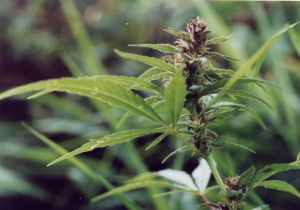 On Tuesday Massachusetts residents voted to pass a ballot initiative allowing the use of medical marijuana. The new law eliminates state criminal and civil penalties for the medicinal use of marijuana. The law will go into effect on January 1, 2013.
On Tuesday Massachusetts residents voted to pass a ballot initiative allowing the use of medical marijuana. The new law eliminates state criminal and civil penalties for the medicinal use of marijuana. The law will go into effect on January 1, 2013.
In order to get a prescription for medical marijuana, a person needs to have a qualifying illness, such as cancer, Parkinson’s disease, HIV, or AIDS. The person must also have a written certification from a physician with whom the patient has a doctor-patient relationship. The patient is allowed to possess up to a sixty-day supply of marijuana for medical use.
The law allows non-profit medical marijuana treatment centers to grow, process and provide marijuana to patients or their caregivers. The law also requires the Department of Public Health (DHP) to issue a cultivation registration to qualifying patients whose access to a treatment center is limited by financial hardship, physical inability to access reasonable transportation, or distance. The patients or their caregivers are only allowed to grow enough plants for a sixty-day supply of marijuana. DPH could revoke any registration for a willful violation of the law. Fraudulent use of a DPH registration could be punished by up to six months in a house of correction or a fine of up to $500, and fraudulent use of a registration for the sale, distribution, or trafficking of marijuana for non-medical use for profit could be punished by up to five years in state prison or by two and one-half years in a house of correction.
Despite the major changes this new law brings to Massachusetts, there is much that this new law does not do. The law does not give a person immunity under federal law. It does not supersede the Massachusetts laws prohibiting possession, cultivation, or sale of marijuana for nonmedical purposes. The law does not allow the operation of a vehicle while under the influence of marijuana. The new law also does not require a health insurer or government entity to reimburse for the costs of the medical use of marijuana. The law does not require any health care professional to authorize the medical use of marijuana. The law does not require any accommodation of the medical use of marijuana in any workplace, school bus or grounds, youth center, or correctional facility. Finally, the new law does not require any accommodation of smoking marijuana in any public place.
The new law will likely lead to confusion, due to the supremacy of federal laws, as well as those Massachusetts laws that supersede the medical marijuana law. Other states, such as California, have had residents face federal charges, despite the state laws that allow the sale and use of medical marijuana.
Anyone planning to use or sell medicinal marijuana should consult a knowledgeable attorney in order to protect him or herself. Attorney Daniel Cappetta is a Massachusetts criminal defense attorney who began his career at the Middlesex County District Attorney’s Office and has extensive knowledge of the Massachusetts marijuana laws.
Contact Attorney Cappetta today if you are planning to use or sell medicinal marijuana in Massachusetts.
 Massachusetts Criminal Lawyer Blog
Massachusetts Criminal Lawyer Blog

